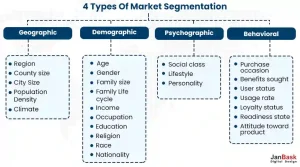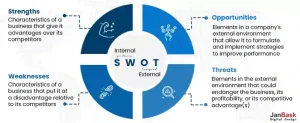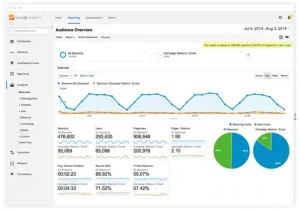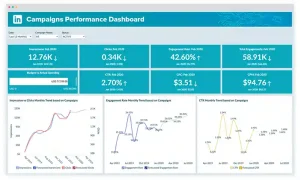
In today's dynamic and ever-evolving business landscape, economic recessions can strike unexpectedly, challenging even the most resilient organizations. The impact of a recession can be felt far and wide, leaving businesses scrambling to find ways to maintain their revenue streams and stay afloat. However, amidst the uncertainty lies an immense opportunity for those who are willing to adapt and embrace innovative revenue-generation strategies.
Digital marketing, with its boundless reach and targeted precision, has proven to be a game-changer for businesses in times of economic downturn. Leveraging the power of technology, data, and consumer behavior insights, digital marketing strategies can help companies navigate the stormy waters of a recession and emerge stronger than ever before.
Let us take a classic example of Burger King.
Burger King has gained legendary status in the realm of digital marketing, thanks to their innovative approach and ability to establish a strong digital footprint. Their digital campaign in the United States exemplified pure genius in marketing strategy. The competitive rivalry between Burger King and McDonald's often created a ripple effect in the digital marketing space, with both brands constantly vying for consumer attention.
Many brands aspire to incorporate the latest technologies into their marketing strategies but often stumble due to their limited experience. However, Burger King is a brand that fearlessly embraces technology, creating marketing experiences that consumers least expect. One such remarkable marketing strategy revolved around voice-enabled devices. Their campaign centered on the catchphrase, "Ok, Google, what is the Whopper burger?" This clever move capitalized on the popularity of Google's voice-activated tools.
When the catchphrase was uttered, nearby home devices would spring to life and provide information about Burger King's famous Whopper burger. The aim was to introduce consumers to the brand and its products in a unique and engaging manner. The reverberation of this campaign was felt throughout the industry, as it became a viral success. While the campaign may not have been flawless, it set a tone that other brands found difficult to replicate.
Burger King's success demonstrated the power of innovative digital marketing strategies and their ability to capture consumer interest and generate buzz. It serves as a testament to Burger King's willingness to think outside the box and make optimal use of technology, ultimately elevating their brand visibility and engagement in the fiercely competitive marketplace.
In this blog, we will delve into the world of digital marketing strategies for B2B specifically designed to maximize revenue during a recession. We will explore a range of proven tactics that empower businesses to connect with their audience, amplify their brand presence, and drive sales in an increasingly competitive market.

Looking for Best Digital Marketing Services?
In times of economic downturn, businesses may consider cutting back on marketing expenses to save costs. However, overlooking the importance of marketing during a recession can hinder opportunities for growth and limit a company's ability to remain competitive. Here us why marketing is crucial even during the recession.
During a recession, consumer spending tends to decrease, and companies often face reduced budgets for marketing efforts. However, maintaining brand visibility through marketing is crucial to remain top-of-mind for consumers. According to a study by the Harvard Business Review, companies that maintained or increased their marketing efforts during a recession experienced higher sales and market share growth in the post-recession period compared to those that reduced or eliminated marketing spend.
A recession can be an opportune time to gain a competitive edge by capturing market share from struggling competitors. According to a report by McKinsey & Company, companies that increased their marketing spend during a recession achieved higher market share gains than those that decreased or maintained their spend.
Investing in marketing efforts during a recession can help foster stronger customer loyalty. When faced with economic uncertainty, consumers are more likely to stick with brands they trust. By staying engaged with customers through targeted marketing campaigns, businesses can solidify their relationships and cultivate long-term loyalty.
Digital marketing provides cost-effective alternatives to traditional advertising channels, making it an ideal strategy during a recession. According to Statista, global digital ad spending is projected to reach $836 billion in 2026, indicating the increasing importance of digital platforms in reaching and engaging consumers. Utilizing digital channels such as social media, email marketing, and content marketing can deliver high ROI while reaching a broader audience.
Consumer behavior undergoes significant changes during a recession. People become more price-conscious, research extensively before making purchasing decisions, and actively seek value for their money. By adapting marketing revenue generation digital marketing strategies to align with these shifting behaviors, businesses can position themselves as trusted solutions providers and effectively capture the attention of recession-weary consumers.
A recession may be a challenging period, but it also presents an opportunity for forward-thinking companies to invest in long-term growth. By strategically allocating marketing resources to enhance brand awareness, acquire new customers, and nurture existing relationships, businesses can create a solid foundation for sustained growth beyond the recessionary period.
Remember, recessions are temporary, but the impact of marketing efforts during these periods can have lasting effects on a company's success. Hiring a reputable digital marketing agency can significantly enhance your online presence and drive business growth.
Before executing the online marketing strategies mentioned above, it is crucial to lay the groundwork, understand what are digital marketing revenue generation strategies and ensure you have the necessary resources and knowledge. Here are four important steps to take:
Set aside resources: Digital marketing requires dedicated resources, including budget, time, and personnel. Allocate a portion of your budget specifically for digital marketing initiatives during a recession. Determine the appropriate staffing and skill set required to execute the revenue generation digital marketing strategies effectively. This could involve hiring or training employees or partnering with external agencies.
Know your audience well: Understanding your target audience is essential for crafting effective marketing campaigns. Conduct market research, analyze customer data, and develop detailed buyer personas. Gain insights into their demographics, preferences, pain points, and behaviors. This knowledge will guide your content creation, messaging, and targeting strategies, ensuring that your marketing efforts resonate with your audience.

Be prepared to use data diligently: Data-driven decision-making is vital for digital marketing success. Implement tools and systems to track and analyze relevant metrics such as website traffic, engagement rates, conversion rates, and ROI. Use these insights to optimize your campaigns, identify opportunities, and make data-backed decisions. Regularly monitor and analyze performance data to adapt your strategies based on real-time results.
Start with looking into your business: Before implementing specific revenue generation strategies, assess your business goals, strengths, and weaknesses. Conduct a thorough evaluation of your current marketing efforts, online presence, and competitive landscape. Identify areas where you can leverage your unique value proposition and competitive advantages. This self-analysis will help you tailor the chosen strategies to align with your business objectives and differentiate your brand in the market.

In times of economic uncertainty, businesses need to explore innovative digital marketing strategies to increase revenue and maintain a competitive edge. Here are 10 effective revenue generation digital marketing strategies to consider:
Building a strong brand presence is crucial during a recession as it helps establish trust, loyalty, and differentiation in the market. Here's how to focus on brand building:
Programmatic advertising enables targeted and efficient ad placements, maximizing your ROI for digital marketing during a recession. Here's how to increase sales through digital marketing and make the most of programmatic advertising:
Email marketing remains a powerful tool to engage with your audience and drive revenue, especially during a recession. To optimize your email marketing campaigns, consider the following:
In a recession, consumers are more cautious with their spending and seek value. By increasing your output of value-based content, you can attract and engage your audience while showcasing your expertise. Consider the following steps:

Our comprehensive digital marketing services encompass search engine optimization, social media management, content marketing, and more, ensuring a holistic approach to boosting your online visibility.
During a recession, customers are likely to be more cautious about their purchasing decisions. Building authority and trust through customer success stories can help alleviate their concerns and drive revenue. Consider the following approaches:
By developing evergreen content, you can provide valuable resources to your audience throughout their buyer's journey, attracting and converting leads even during a recession. Consider the following steps:
LinkedIn Advertising and paid social media advertising provide opportunities to reach highly targeted audiences, generating qualified leads and driving revenue. Follow these revenue generation strategies:

Search engine optimization (SEO) is crucial for improving your website's visibility, driving organic traffic, and increasing revenue during a recession. Consider the following SEO revenue generation digital marketing strategies:
Conversion rate optimization (CRO) helps maximize the effectiveness of your website in turning visitors into customers. By improving your conversion rates, you can increase revenue without necessarily increasing traffic. Consider the following CRO revenue generation strategies:
To make the best out of digital marketing, businesses must focus on brand building, optimize email campaigns, create valuable content, prioritize SEO, and implement conversion rate optimization strategies to drive revenue growth.
Virtual events have become increasingly popular during a recession, offering cost-effective ways to connect with your target audience. Here's how to increase sales through digital marketing by setting up successful virtual events:
1. Can data analysis and tracking help improve digital marketing strategies during a recession?
Absolutely. Analyzing data and tracking key metrics is essential for understanding the effectiveness of digital marketing efforts. By closely monitoring website analytics, conversion rates, and customer behavior, businesses can make data-driven decisions, identify areas for improvement, and optimize their marketing strategies to increase revenue even in a recessionary period.
2. Are there specific digital marketing techniques that work well during a recession?
Yes, certain techniques are particularly effective during a recession. For instance, remarketing or retargeting campaigns can help re-engage potential customers who showed interest in your products or services. Additionally, offering discounts, promotions, or exclusive deals through digital channels can incentivize customers to make purchases despite economic uncertainty.
3. How can digital marketing help increase revenue during a recession?
Digital marketing offers cost-effective and targeted strategies to reach a wider audience and generate leads. By leveraging digital platforms, businesses can engage with customers, build brand awareness, and drive sales, even in a challenging economic climate.
4. What are some effective digital marketing strategies to boost revenue during a recession?
Some effective strategies include search engine optimization (SEO) to improve website visibility, pay-per-click (PPC) advertising to drive targeted traffic, email marketing to nurture customer relationships, social media marketing to engage with the audience, and content marketing to establish thought leadership and attract potential customers.
5. How can focusing on brand building help increase revenue during a recession?
Brand building creates a strong and recognizable identity for your business, increasing customer trust and loyalty. By consistently delivering value and engaging with your audience through various channels, you can differentiate your brand and attract more customers, ultimately driving revenue growth.
6. Why is optimizing email marketing campaigns important during a recession?
Email marketing is a cost-effective and targeted approach to engage with your audience. By segmenting your email list, personalizing content, and providing valuable offers or resources, you can nurture leads, drive conversions, and generate repeat business, all of which are essential for revenue growth in a recession.
7. How can value-based content help increase revenue during a recession?
Value-based content demonstrates your expertise, builds trust, and establishes your brand as a go-to resource. By offering informative and helpful content that addresses your audience's challenges, you can attract and retain customers, generate leads, and ultimately drive revenue by showcasing the value you provide.
8. Why is SEO important for increasing revenue during a recession?
SEO improves your website's visibility in search engine results, driving organic traffic and increasing your chances of attracting qualified leads. By optimizing your website and content for relevant keywords, you can rank higher in search results, gain exposure, and ultimately drive more conversions, contributing to revenue growth.
9. How does conversion rate optimization (CRO) impact revenue during a recession?
CRO focuses on optimizing your website and marketing campaigns to improve the percentage of visitors who take the desired actions, such as making a purchase or filling out a form. By enhancing the user experience, streamlining conversion processes, and testing different elements, you can increase conversion rates, maximize revenue, and make the most of your existing traffic.
Implementing online marketing strategies is vital for businesses seeking to increase revenue and thrive during a recession. By focusing on brand building, setting up virtual events, increasing programmatic advertising spend, optimizing email marketing campaigns, increasing the output of value-based content, building authority through customer success stories, creating evergreen content, utilizing LinkedIn Advertising and paid social, prioritizing SEO, and focusing on conversion rate optimization, companies can position themselves for success even in challenging economic times.
However, it is crucial to remember that executing these strategies requires careful planning, adequate resources, a deep understanding of your target audience, and a diligent approach to data analysis. If you're looking for guidance and support in implementing these digital marketing strategies, JanBask Digital Design is here to help. With their expertise in digital marketing and a proven track record of success, JanBask can provide the necessary insights and strategies to drive revenue growth and navigate the challenges of a recession.
In these uncertain times, embracing digital marketing strategies and partnering with trusted digital marketing companies like JanBask can empower businesses to not only survive but thrive in the face of economic downturns. So, take the leap, adapt your marketing approach, and unlock the potential for increased revenue and long-term success.
Interested in our Digital Marketing Services ?

C
These digital marketing strategies are exactly what businesses need during a recession! By targeting the right audience and optimizing their online presence, companies can stay competitive and generate revenue even in challenging times. Great article!
S
I’ve been implementing some of these strategies for my clients, and they have been seeing positive results. Remarketing campaigns and personalized content really make a difference in driving conversions. Thanks for sharing these valuable insights!
K
As a small business owner, it’s encouraging to know that digital marketing can help boost revenue during a recession. I appreciate the emphasis on cost-efficiency and targeting. It’s all about making the most of our limited resources. Time to revamp my marketing strategy!
H
I love the idea of adapting digital marketing strategies during a recession. It’s all about being agile and finding creative ways to reach and engage with customers. This article has inspired me to think outside the box and explore new avenues to increase revenue.
D
Data analysis is key! I can’t stress enough how important it is to track and analyze the performance of your digital marketing campaigns. With the right data insights, you can make informed decisions and optimize your strategies for better results. This post really highlights the value of data-driven marketing.